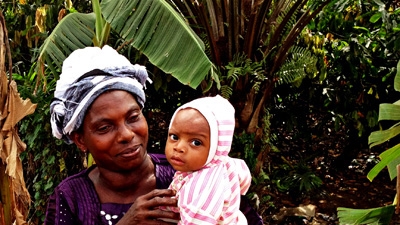ABUJA, April 13, 2012 — Better healthcare for women in low-income households is a formidable challenge in Nigeria, which accounts for 10 percent of all maternal deaths globally. In Adamawa, one of the country’s largest states, the chances of a pregnant woman delivering her baby with the help of a skilled worker are just one in seven.
Like other states in Nigeria, Adamawa has numerous primary health centers for its citizens. Despite the existence of these centers and a relatively high level of investment in health, good-quality basic health services are not easily available to poor people. This gap, which is common across Nigeria, partly explains why the country has not made faster progress to date on maternal and child health.
Strong action to keep more mothers and children alive and healthy
In a recent drive for rapid health results, Adamawa, along with Nasarawa and Ondo states, is rising to the challenge with strong action that could benefit as many as 3.8 million women and children. The idea is to reduce the obstacles commonly encountered at health centers, including low motivation among health workers, a lack of management, and frequent stock-outs of essential medicines and supplies.
These states now will make significant changes at the health center level—introducing autonomy, enhancing management training, and offering financial incentives to centers that carry out pre-agreed services such as delivering babies safely and immunizing children, with due attention to quality. State or local government institutions will also be rewarded for providing health centers and district hospitals with the right kind of support.
This investment approach, called “Results-Based Financing”, has been supported by the World Bank in many African countries. In Rwanda, where frontline health centers have received performance incentives nationwide, an impact evaluation supported by the Bank found that rewarding good performance has contributed to rapid nationwide health gains.
The World Bank is supporting this approach in Nigeria with financing of $150 million for the Nigeria State Health Investment Project, as well as $21.5 million from the Health Results Innovation Trust Fund that will fund, among other things, a rigorous impact evaluation to see how well the approach works in the three states and its applicability elsewhere in Nigeria.
“For years we’ve had investment from public and other sources towards health sector improvement and there was a lag between those investments, expectations, and the reality that we have experienced in our country,” said Dr. Mohamed Pate, Nigeria’s Minister of State for Health. “I believe Results-Based Financing will help us to make faster progress, but let’s demonstrate it with this project as a start.”
Spotlight on essential services at clinics and hospitals
What the changes mean for Nigerian women of child-bearing age who live in poor households in these states is that their chances of getting potentially lifesaving care at any of the facilities targeted by the project—including 576 primary health centers and 53 general hospitals—could go up significantly over the next few years, as performance incentives begin to work.
Three secondary hospitals will also be targeted, including the Maternal and Child Hospital in Ondo State, which is currently the apex hospital in the Abiye scheme launched by the Ondo government in 2009. This hospital has already been experimenting with various innovations to enhance quality of care and a focus on results.
Health facilities receive cash rewards based not only on the quantity of pre-agreed services provided, but also the quality of these services, and the remoteness of the center’s location. If good quality services are provided, the center can receive a significantly large bonus payment. Centers can use the money both for their own operational costs as well as for staff incentives.
“At the root of it all, we believe that health workers respond to incentives, and if the incentives are aligned to good service delivery, we should see a commensurate response,” said Dr. Mohamed Ali Pate.
“In addition to checks at the health center level and information from surveys, communities will also participate in verifying the impact of these improvements,” explained Dinesh Nair, the World Bank Task Team Leader for the project. “Grassroots organizations will visit randomly selected households based on health center records to check if they exist and if they actually received the services, and to document their opinion.”
Small-scale trial is already spurring change
The three states have already invested their own resources to conduct a small-scale trial in the East LGA (Ondo), Wamba LGA (Nasarawa) and Fufure LGA in Adamawa. A web-based database has been set up to record data on the quantity and quality of services. A clear early finding is that there needs to be an emphasis on merit-based management at the facilities; performance issues need to be dealt with, and a yard-stick competition for health facility managers is being designed based on this experience.
“The Results-Based Financing pre-pilot in Fufore LGA is a practical game changer,” said Yuguda Yusuf, Director, Primary Health Care, Fufore LGA. “We made so much difference in a short time and proudly take responsibility for improved performance. Patient flow and institutional delivery increased by 300 and 200 per cent respectively within three months and with a small amount of money.”
“Komai ya canza a asibitin na (everything has suddenly changed for better in the clinic),” said Malama Salamotu Abbo, a patient visiting a Primary Health Center in Fufore.
The improvements planned by the states implementing Results-Based Financing in their health sectors is in line with the National Strategic Health Development Plan (2010-2015) recently endorsed by Nigeria’s Federal Government. The plan marks a clear shift towards focusing resources and measuring results.

